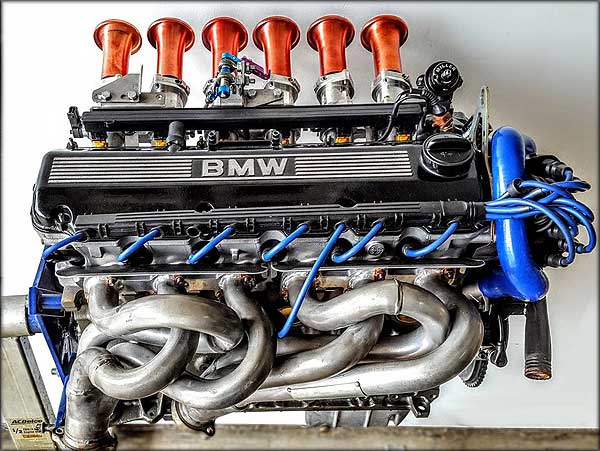The Duty of BMW Engine Design in Getting Exceptional Fuel Efficiency
The Duty of BMW Engine Design in Getting Exceptional Fuel Efficiency
Blog Article
Unveiling the Intricacies of Next-Generation Power Units: a Deep Dive Into Advanced Engine Innovations and designs
As we stand on the precipice of a new era in transport, the intricacies of next-generation engine layouts beckon us to discover the advanced modern technologies and developments that assure to redefine the driving experience. Digging much deeper into the worlds of emission control, intelligent engine monitoring systems, and the horizon of power device development, we discover ourselves on the cusp of a transformation that guarantees to improve the landscape of movement as we recognize it.
Evolution of Engine Materials

The shift in the direction of progressed engine products has actually also allowed designers to design engines with greater power results while maintaining fuel effectiveness criteria. The usage of light-weight products lowers the total weight of the engine, leading to boosted gas economic situation and reduced exhausts. Additionally, advancements in materials technology have permitted better thermal management within engines, resulting in boosted reliability and longevity.
Turbocharging and Supercharging Technologies
How do Turbocharging and Supercharging Technologies revolutionize engine efficiency and effectiveness in modern lorries? Turbocharging and turbo charging are technologies that significantly boost engine performance by increasing the quantity of air intake right into the burning chamber. Turbocharging achieves this by making use of a wind turbine driven by exhaust gases to pressurize the intake air, while turbo charging utilizes a belt- or chain-driven compressor to attain the exact same effect.
These modern technologies allow smaller, extra fuel-efficient engines to create power equivalent to bigger ones, referred to as downsizing. By requiring more air right into the cylinders, supercharging and turbocharging improve burning efficiency, leading to increased horse power and torque output without a considerable increase in engine size. This leads to much better velocity, hauling ability, and overall driving efficiency.
In addition, turbo charging and turbocharging add to enhanced gas effectiveness by permitting the usage of smaller engines that take in much less fuel under regular driving conditions - bmw engine. This mix of enhanced efficiency and effectiveness has made turbocharging and turbo charging integral elements of several modern engine styles
Discharge Control and Environmental Influence
With increasing worldwide worries regarding air quality and environmental sustainability, the application of exhaust control modern technologies in vehicles plays a vital duty in reducing damaging contaminants launched right into the ambience. Modern vehicles are outfitted with sophisticated emission control systems that aid minimize the environmental impact of automobile operations. Catalytic converters, as an example, are developed to convert harmful gases such as carbon monoxide, nitrogen oxides, and hydrocarbons into less hazardous substances like carbon dioxide and click water vapor.
Furthermore, developments in engine innovation, such as the integration of exhaust gas recirculation systems and selective catalytic reduction, have actually dramatically added to reducing discharges. These innovations operate in tandem to optimize burning effectiveness and lessen the release of hazardous pollutants right into the air. Furthermore, the advancement of hybrid and electrical automobiles represents an essential action in the direction of decreasing the overall environmental impact of the transportation sector.
Intelligent Engine Monitoring Solution

Additionally, these systems enable automobiles to meet rigorous discharges standards without jeopardizing performance, supplying a much more eco-friendly driving experience. The assimilation of expert system and device understanding abilities in engine monitoring systems continues to press the boundaries of what is possible, leading to additional renovations in efficiency, dependability, and overall car efficiency. bmw engine. As automotive innovation advances, intelligent engine administration systems will certainly play an important duty fit the future of transportation in the direction of a more reliable and lasting direction
Future Trends in Power System Growth
As intelligent engine management systems pave the way for enhanced control and optimization in modern vehicles, future trends in power device growth are positioned to redefine the landscape of auto propulsion modern technologies. These different power resources use enhanced effectiveness and performance while aligning with stringent ecological laws.
One my response more considerable trend is the integration of innovative products and producing techniques. Lightweight products such as carbon fiber and light weight aluminum are being utilized to reduce total car weight, boosting fuel efficiency and efficiency. Furthermore, developments in 3D printing and additive manufacturing are making it possible for the manufacturing of complex engine parts with greater precision and durability.
In addition, man-made intelligence and artificial intelligence are playing an important role in maximizing power unit efficiency. These innovations enable real-time tracking and flexible control, causing more reliable and reputable power delivery. Generally, future trends in power system development are geared in the direction of performance, sustainability, and performance, driving the auto industry in the direction of a brand-new era of propulsion innovations.

Verdict
To conclude, the developments in engine products, turbocharging, emission control, and smart management systems have actually paved the method for next-generation power units. These developments have not just better performance and efficiency yet also decreased ecological effect. As modern technology remains to advance, future trends in power system growth are likely to concentrate hop over to here on more improving sustainability and maximizing power result. The elaborate layouts and innovations in contemporary engines display the recurring evolution of vehicle modern technology.
Exploring the progressive developments in engine products has actually been essential in boosting the efficiency and performance of modern engines. Over the years, the evolution of engine materials has played an important function in pushing the limits of what engines can accomplish.The shift towards advanced engine materials has also enabled engineers to design engines with greater power results while keeping gas performance requirements.The application of intelligent engine management systems in modern vehicles has actually revolutionized the means engines are regulated and maximized for performance and effectiveness. By collecting information in real-time and assessing it with innovative formulas, intelligent engine management systems can adjust to driving designs, environmental elements, and engine health to optimize power outcome while reducing fuel intake and discharges.
Report this page